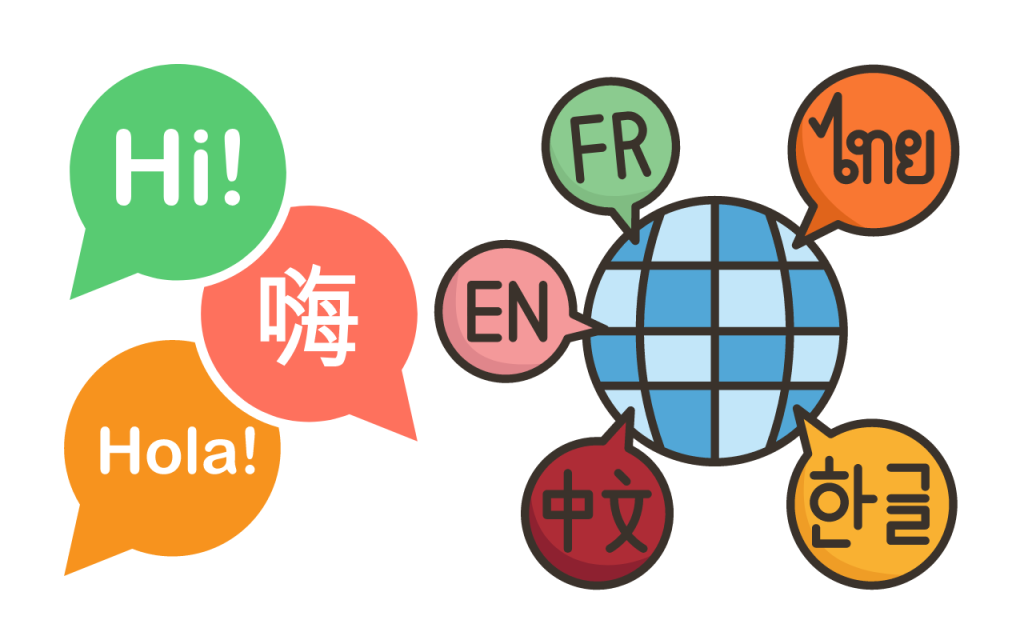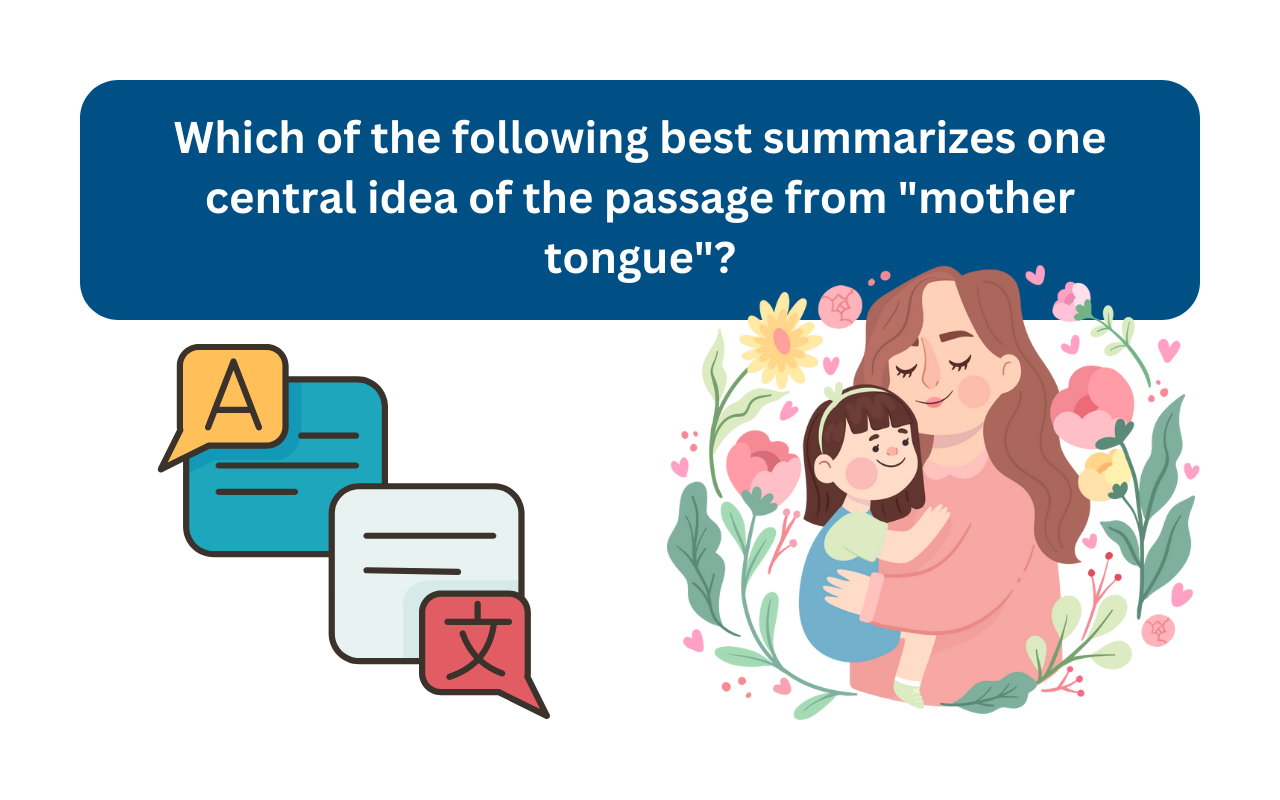Which of the following best summarizes one central idea of the passage from “mother tongue”?
“Mother Tongue” is an essay written by Amy Tan, a renowned Chinese-American author, which explores the complex relationship between language and identity. In this passage, Tan reflects on her experiences with different forms of English and the cultural implications that language carries. The central idea of the passage is to highlight the power and significance of language in shaping an individual’s understanding of themselves and their place in society.
Answer: The option that best summarizes one central idea of the passage from “Mother Tongue” is The way a person speaks English is not a good measure of intellectual ability.
[lwptoc]
The Influence of Language on Identity
Language as a Form of Self-Expression:
- Tan discusses her mother’s limited English skills and how it shaped their relationship.
- The author reflects on the disparity between her mother’s “broken” English and her own command of the language.
- The use of language becomes a marker of identity and an expression of cultural background.

The Perception of Language by Others:
- Tan reveals instances where her mother was treated differently due to her limited English.
- The author discusses how language proficiency can affect a person’s perception in society.
- The passage emphasizes the importance of language as a means of social acceptance and integration.
The Power Dynamics of Language
The Hierarchy of Language:
- Tan highlights the existence of a language hierarchy in society, with “standard” English at the top.
- She emphasizes that different forms of English reflect different social classes and cultural backgrounds.
- The passage sheds light on the prejudice faced by individuals who speak English as a second language or with an accent.
The Limitations of Language:
- Tan shares anecdotes where her mother’s ideas were dismissed due to her limited English.
- The passage explores how language limitations can undermine an individual’s intelligence and capabilities.
- The author argues that language proficiency does not equate to intellectual capacity.
Embracing the Complexity of Language
Personal Identity and Language:
- Tan discusses her own journey of embracing her mother’s “broken” English as a unique form of communication.
- The passage encourages embracing language diversity as an integral part of personal identity.
- Tan highlights the richness and depth that can be found in non-standard forms of English.
The Power of Storytelling:
- Tan illustrates the power of storytelling and the emotional connection it creates.
- The passage showcases the ability of language, regardless of its form, to convey profound experiences and emotions.
- The author emphasizes the importance of valuing and preserving cultural and linguistic heritage.

Table: Language Variations and Cultural Significance
| Language Variation | Cultural Significance |
|---|---|
| Standard English | Associated with higher social status and education |
| Non-Standard English | Reflects cultural diversity and personal identity |
| English as a Second Language | Represents multiculturalism and immigrant experiences |
| Accented English | Often subject to bias and stereotyping |
How does tan build a central idea of her story in the excerpt?
In the excerpt from “Mother Tongue,” Amy Tan builds a central idea by employing various rhetorical strategies and narrative techniques to convey the significance of language in shaping identity and the complex dynamics surrounding it. Through personal anecdotes, contrasting language variations, and reflective commentary, Tan effectively emphasizes the power of language and its impact on individuals and their relationships with others.
Personal Anecdotes:
Tan begins by sharing personal stories about her mother’s limited English skills and the challenges they faced in communicating. These anecdotes serve to humanize the issue and provide a relatable context for readers. By sharing intimate details about her own experiences, Tan establishes a connection and credibility with the audience.
Contrasting Language Variations:
Tan highlights the contrasting language variations used by herself and her mother. She compares her own “standard” English to her mother’s “broken” English, highlighting the stark differences between the two. This contrast underscores the hierarchy of language and its impact on social acceptance and perception.
Narrative Structure:
Tan structures her essay in a way that weaves personal narratives, observations, and reflections. This narrative structure allows the reader to follow her thought process and emotional journey. By sharing her own experiences, Tan not only presents a compelling narrative but also invites readers to reflect on their own experiences with language and identity.
Reflective Commentary:
Throughout the excerpt, Tan interjects with reflective commentary, providing her own insights and interpretations. She delves into the complexities of language, addressing topics such as cultural background, intelligence, and stereotypes. Through her commentary, Tan challenges preconceived notions about language and prompts readers to critically examine their own assumptions.
Use of Vivid Language:
Tan employs vivid and descriptive language to evoke emotions and create a sense of empathy. She uses imagery to paint a clear picture of her mother’s struggles with English, making the reader truly understand the impact of language limitations. This use of vivid language helps to strengthen the central idea by appealing to the reader’s senses and emotions.
Emotional Appeal:
Tan infuses her writing with emotional appeal, particularly through the use of personal stories. By sharing heartfelt anecdotes about her mother’s experiences, Tan elicits empathy and fosters a deeper connection with the reader. This emotional appeal reinforces the central idea by emphasizing the personal and human aspect of language.
Which best summarizes the central idea of the excerpt?
The central idea of the excerpt from “Mother Tongue” by Amy Tan is that language plays a significant role in shaping an individual’s identity and their place in society. Tan explores the power dynamics and prejudices associated with different forms of language, highlighting the impact on social acceptance and personal relationships. She emphasizes the importance of recognizing and valuing linguistic diversity, as well as challenging preconceived notions about language proficiency and intelligence. Ultimately, Tan advocates for embracing the complexity of language and its ability to convey profound experiences and emotions.
The inference suggested by this excerpt is that nonstandard forms of English .
The inference suggested by this excerpt is that nonstandard forms of English, such as “broken” English or English spoken with an accent, should be recognized and valued as legitimate forms of communication. Amy Tan challenges the notion that standard English is superior and highlights the richness and depth found in nonstandard forms of English. She shares personal anecdotes about her mother’s struggles with limited English skills and emphasizes the emotional connection and power of storytelling, regardless of the form of English used. The passage suggests that nonstandard forms of English are integral to personal identity and cultural diversity, and they should be respected and celebrated rather than marginalized or dismissed.
What can be inferred from the excerpt?
From the excerpt of “Mother Tongue” by Amy Tan, several inferences can be made:
- Language proficiency affects social perception: The excerpt suggests that individuals who have limited English skills or speak English as a second language may face prejudice or be treated differently in society. The proficiency or fluency in English can impact how others perceive and interact with individuals, highlighting the power dynamics associated with language.
- Language proficiency does not equate to intelligence: The passage challenges the assumption that language proficiency directly correlates with one’s intellectual capabilities. Tan’s mother, despite her limited English skills, possesses intelligence and wisdom that might be overlooked or underestimated due to language barriers.
- Language is tied to cultural identity: The excerpt highlights the connection between language and cultural identity. Different forms of English reflect diverse cultural backgrounds and experiences. Nonstandard forms of English, such as “broken” English or accents, can represent the multiculturalism and immigrant experiences of individuals.
- Nonstandard forms of English have value: Tan suggests that nonstandard forms of English, including her mother’s “broken” English, should be recognized and respected as legitimate forms of communication. These forms of English hold unique narratives, emotional depth, and personal connections that are equally powerful and meaningful.
- Storytelling transcends language barriers: The excerpt emphasizes the power of storytelling to bridge gaps created by language differences. Tan illustrates how regardless of the form of English used, storytelling can convey profound experiences and emotions, fostering understanding and connection among people.
- Language diversity should be embraced: The passage encourages embracing linguistic diversity and valuing the richness it brings to personal and cultural narratives. Tan challenges the notion that standard English is superior and advocates for a more inclusive perspective that appreciates and preserves the variety of languages and forms of English.
Which of the following best summarizes my mother? | Qs k plays
In “Mother Tongue,” Amy Tan explores her relationship with her own mother, who had limited English proficiency. The essay highlights the challenges and complexities faced by her mother due to language barriers and societal biases. Tan’s mother’s experiences with language influenced their relationship and communication. While facing discrimination, her mother’s determination and resilience shone through. The essay ultimately celebrates the strength and resilience of Tan’s mother, emphasizing the importance of embracing one’s native language and challenging societal judgments based on English proficiency.
Conclusion:
The passage from “Mother Tongue” by Amy Tan revolves around the central idea of the power and significance of language in shaping one’s identity and place in society. It explores how language can become a defining characteristic, influencing social acceptance, and revealing the intricate power dynamics within communities. Tan’s essay ultimately encourages embracing language diversity and recognizing the richness that different forms of language bring to personal and cultural narratives.
#the inference suggested by this excerpt is that nonstandard forms of english .



